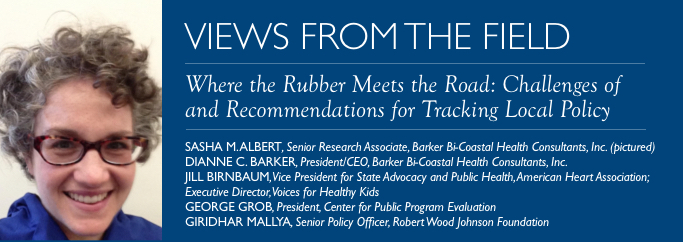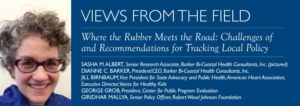
If you advocate for, research, evaluate, or fund policy change, a local policy database will enrich and facilitate your work. Local policy tracking enables advocates to understand the degree to which health-promoting policies have diffused across jurisdictions and where to target future investments. It allows policymakers to assess whether and how neighboring (or similar) communities have addressed common challenges. And it empowers scientists with data to assess policy diffusion, identify natural experiments for evaluation, and explore the importance of policies’ components and provisions for bettering health.
Tracking local policy is challenging, however. While many sources monitor state-level legislative policy (ncsl.org, lawatlas.org, https://www.congress.gov/state-legislature-websites), local policy data is not so readily available. In this piece, we share recommendations for tracking local policy from our work on the evaluation of Voices for Healthy Kids® (VOICES). VOICES is a collaborative initiative of the Robert Wood Johnson Foundation (RWJF) and the American Heart Association (AHA) to reverse childhood obesity through public education and advocacy. The initiative awards grants to state and local advocacy coalitions active in childhood obesity to encourage evidence-based regulatory and legislative activity. VOICES grantees can only use AHA funds (not RWJF grant support) for lobbying purposes.
Is Anyone Tracking Local Childhood Obesity Policy?
From November 2015 to February 2016, the evaluation team interviewed representatives of 16 organizations and projects involved with local childhood obesity policy, and reviewed policy surveillance reports from Public Health Law Research (PHLR) and the National Network of Public Health Institutes (NNPHI). The team also interviewed one county collecting tobacco policy, and explored a publicly available tobacco policy database, as both are exemplars of local policy tracking.
| Table 1. Publicly Accessible Local Policy Databases | |
| Database Name | Organization, Project or Locality |
| CityHealth | de Beaumont Foundation |
| ENACT | Prevention Institute |
| Food Policy Networks | Johns Hopkins Center for a Livable Future |
| HEAL Library | LiveWell Colorado |
| Livability Index | AARP |
| PolicyLift | Washington University Center for Obesity Prevention |
| School District Wellness Policies | Bridging the Gap |
| U.S. Tobacco Control Laws Database © | Americans for Nonsmokers’ Rights Foundation |
| No name | Growing Food Connections |
| No name | King County, WA |
We found that nine of these organizations, projects, and localities maintain local policy tracking databases, as does a tenth, CityHealth (Table 1). However, these databases all cover limited policy topics, geographical areas, or environments (schools, workplaces, etc.) and none cover all types of policy that could address childhood obesity at the local level. In addition to these databases’ limited content, there are no standardized collection or storage methods for local policy data.
The policy surveillance reports we reviewed confirm these findings. NNPHI notes that existing local policy databases “often contain a limited number of healthy communities’ topics and cover a specific geographic region” (Local Policy Database Scan, 2013). The PHLR report likewise describes existing databases as “non-standardized, topically siloed,” with a “lack of uniformity in standards and practices, from legal research to data delivery” (Resources for Policy Surveillance, 2015).
Recommendation 1: Be Clear about Your Goals and Be as Systematic as Possible
There is a clear need for comprehensive local policy tracking—and we believe it is a challenge worth accepting. This set of recommendations is intended as a guide for funders who, with their institutional grantees or community partners, are planning or developing a local policy tracking database.
Purpose: Be clear about the purpose of your local policy database. Will it be a resource for internal evaluations—or for advocates, the public, policymakers, or researchers? The purpose of your database will guide its development.
Guiding Questions: Base your database on clear, distinct guiding questions related to its purpose, and on your available resources for policy collection. This will determine the amount and type(s) of policy data you will collect. For VOICES, we recommended the following:
- To what extent are local policies related to childhood obesity prevention being passed?
- To what extent do the number and type of these policies change over time?
- How is the VOICES initiative related to the passage of these policies?
Stepwise Development: Create your database in phases, starting with a pilot to collect a limited amount of policy information, on a defined range of policy topics, from clearly defined types of jurisdictions. This will test whether your sampling and data collection methods address your guiding questions before you attempt more comprehensive data collection.
Sampling: Develop a sampling frame to select localities for inclusion in your database. This requires determining your population(s) of interest, whether to stratify or oversample certain areas, and what types of localities are most relevant. Base your sampling frame on your guiding questions and your available resources for policy collection.
Content and Scope: Determine which types of policies to include—only legislation, or also regulations and executive orders—and whether you will collect all policies, or only policies that have been passed or approved. Be sure to include all relevant policies—not all policy that affects healthy food access, for instance, is clearly related to food. Zoning laws may seem unrelated, but they can affect whether new supermarkets can operate in areas currently lacking them. We recommend working with content area experts to determine what to include.
Data Sources: Determine reliable sources for local policy data. Due to the lack of standardized sources, our interviewees used newspapers, other organizations’ newsletters, social media, Google news alerts, surveys, self-reporting via online forms, key informant interviews, and informal relationships with health departments, advocates, and local government officials. VOICES, for example, relies on “the eyes and ears of our staff and grantees in the 50 states” to stay abreast of local policy changes. Additional sources may include local government websites, local ordinance publishers (amlegal.com, municode.com), and the databases listed in Table 1. Be creative about which sources you explore, while also verifying their validity and reliability.
Structure: Review existing database structures and as you build your database, and seek existing local policy and mapping expertise.
Analytic Features: Include such features as searching, mapping, and importing and exporting data.
Longevity: Be deliberate about the duration of your database project. Determine the need for, frequency of, and costs of maintenance, and plan for what to do if you discontinue it. This is especially important if your database is for public use.
Recommendation 2: Keep an Eye on Capacity
So far, no single institution tracks local childhood obesity prevention policy in a comprehensive, national way, chiefly due to the sheer quantity of work involved. The most frequent challenge our interviewees cited was the large, ongoing organizational capacity required to manage and maintain a local policy database. Because there are no standardized sources for local policy data, it is extremely time-consuming to collect; moreover, local policy can change quickly, requiring regular database updates.
Capacity is the largest hurdle to establishing a comprehensive national local policy database, but by setting realistic expectations, it can be addressed. As funders, you can set up a local policy tracking project for success by creating the necessary capacity, and by setting achievable parameters for your grantees and partners.
Resources
Americans for Nonsmokers’ Rights Foundation. (2017). Americans for Nonsmokers’ Rights. Retrieved from www.no-smoke.org
Burris, S. A Technical Guide for Policy Surveillance. Public Health Law Research, Temple University, 2014. Retrieved from https://papers.ssrn.com/sol3/papers2.cfm?abstract_id=2469895
Chriqui JF, O’Connor JC, Chaloupka FJ. What gets measured, gets changed: evaluating law and policy for maximum impact. J Law Med Ethics. Mar 2011;39 Suppl 1:21-26.
National Network of Public Health Institutes. Local Policy Database Scan. 2013.
The Policy Surveillance Program. (n.d.) Learning Library. Retrieved from https://lawatlas.org/page/lawatlas-learning-library
Public Health Law Research. Resources for Policy Surveillance. 2015. Retrieved from https://publichealthlawresearch.org/product/resources-policy-surveillance

